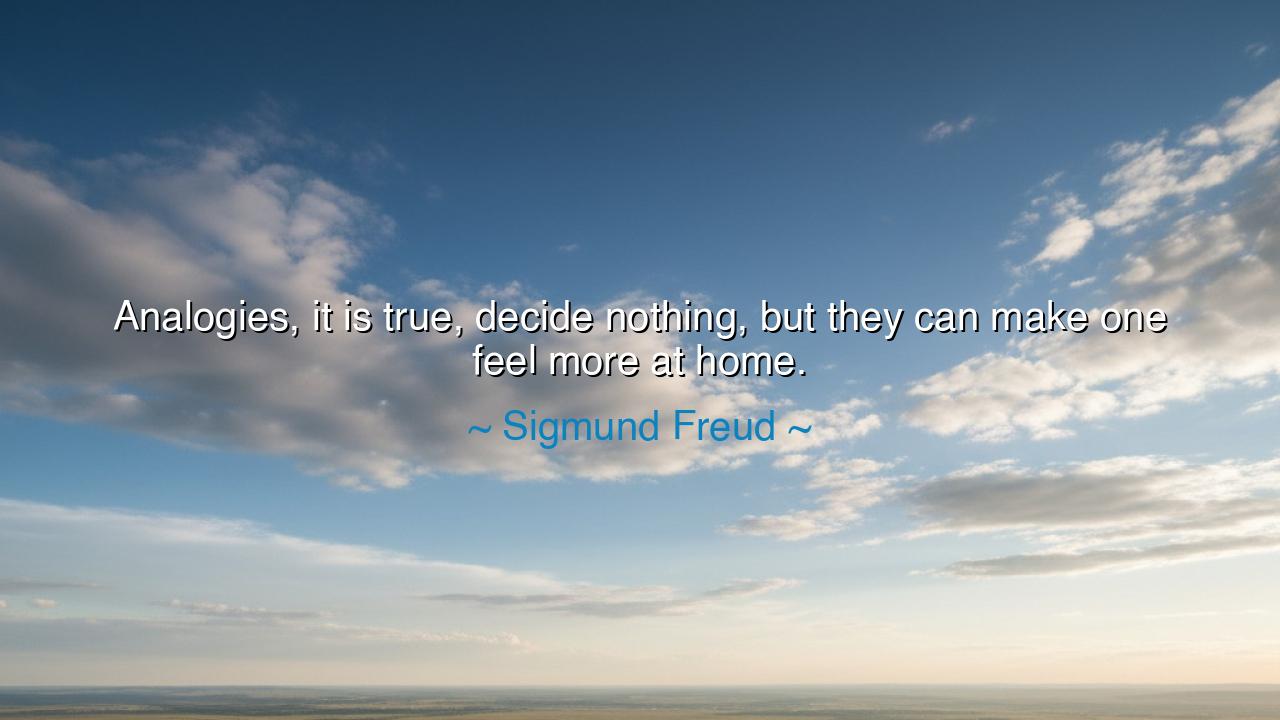
Analogies, it is true, decide nothing, but they can make one feel






In the labyrinth of human understanding, there are moments when logic falters, and the mind, weary from its search for truth, seeks not certainty but comfort. It was in this spirit that Sigmund Freud, the father of psychoanalysis, uttered these immortal words: “Analogies, it is true, decide nothing, but they can make one feel more at home.” At first glance, the saying seems humble — almost a concession — yet beneath its surface lies a profound meditation on the way the human mind bridges the unknown. For though analogies may not prove a truth, they light a lantern along the dark corridors of thought, allowing us to dwell more easily amidst mystery.
Freud, who devoted his life to exploring the hidden chambers of the psyche, understood that reason alone cannot calm the restless spirit. The intellect may dissect and analyze, but the heart yearns for connection, for patterns that make the vast complexity of existence feel familiar. An analogy, then, is not merely a comparison — it is a bridge between the strange and the known, between chaos and comprehension. It does not claim victory in argument, but it offers a resting place for the mind, a hearth in the cold wilderness of uncertainty.
In the age of the ancients, philosophers and poets alike wielded analogy as both weapon and balm. Plato, in his allegory of the cave, did not prove his ideas through mathematics or data — he spoke in images, of shadows and light, of prisoners and philosophers. Through his analogy, men could feel their way toward understanding, sensing the truth before they could articulate it. So too did Freud, centuries later, reach into the human soul using images — the iceberg, the dream, the mirror — symbols that made the unseen visible, that made the terrifying familiar. For to feel “at home” in one’s own thoughts is no small victory; it is the first step toward wisdom.
Consider the example of Galileo Galilei, who dared to look to the heavens and declare that the Earth moved around the Sun. His evidence was revolutionary, yet his words alone might have fallen on deaf ears had he not clothed them in analogy. He compared the universe to a grand clock — each planet a gear in divine motion. This image did not decide the argument, as Freud would say, but it made the idea livable, understandable to the hearts of men unready for the vastness of truth. Through analogy, Galileo built a ladder for others to climb from disbelief to wonder.
Freud’s wisdom, then, is not a dismissal of analogies but a reverent recognition of their role. They may not conquer uncertainty, but they tame it. They are the storytellers within logic’s fortress — the poets standing beside the scientists, translating discovery into meaning. They remind us that to understand is not only to know, but to feel at ease with what is known. For if the intellect is the sword of truth, analogy is the fire that warms those gathered around it.
And yet, there is caution in his tone — a whisper of humility. Analogies decide nothing, he warns, for they are tools of guidance, not judgment. The wise must never mistake the map for the territory, nor the metaphor for the fact. To cling too tightly to analogy is to risk illusion; to reject it entirely is to invite despair. Thus, the true seeker walks a middle path — using analogy as a companion, not a master, as a light to illuminate, not to blind.
The lesson, therefore, is this: embrace analogy as the language of the soul. When you struggle to comprehend the world’s vastness, find in comparison the thread that ties new truths to your familiar heart. When you teach, speak in images that others may inhabit; when you learn, let metaphors guide you gently through the unknown. For it is not always victory in reason that brings peace, but the feeling of belonging within one’s own understanding.
So let the wisdom of Freud be your guide: do not seek only to decide, but also to dwell — to build a home within your thoughts. For knowledge without comfort is barren, but knowledge made human through analogy becomes light — a fire of understanding, by which the mind and heart together may find warmth amid the vast, cold stars of truth.






AAdministratorAdministrator
Welcome, honored guests. Please leave a comment, we will respond soon